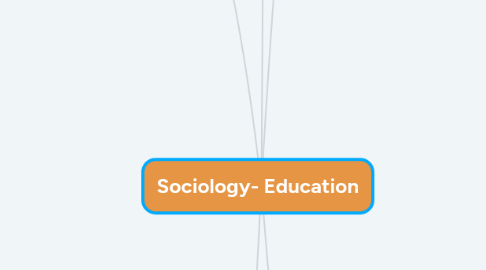
1. Functions of Education
1.1. Sociological perspectives
1.1.1. Functionalist
1.1.1.1. Consensus theory
1.1.1.2. Three main functions of education
1.1.1.2.1. Socialisation
1.1.1.2.2. Acquisition of skills
1.1.1.2.3. Role allocation
1.1.2. Marxist
1.1.2.1. Conflict theory
1.1.2.2. Education system supports capitalism
1.1.2.2.1. WC= labour
1.1.2.2.2. MC=better jobs because of the education system
1.1.2.3. Meritocracy=myth
1.1.2.4. Two main functions of education
1.1.2.4.1. Reproduction of social inequalities
1.1.2.4.2. Legitimisation of social inequalities
1.1.3. Feminists
1.1.3.1. A lot of patriarchy in schools
1.1.3.2. Feminists have changed the way girls achieve in school
1.1.4. The New Right
1.1.4.1. Political Functionalists
1.1.4.2. School should be run like a business
1.1.4.2.1. Marketisation
1.1.4.3. Current education system is good for everyone
1.1.4.4. Chubb and Moe
1.1.4.4.1. Marketisation is a good for the education system as it improves standards and efficiency
2. Education Policies
2.1. Before 1979
2.1.1. 1870 Education Act- Foster Act
2.1.1.1. Introduce compulsory education
2.1.2. 1918 Education Act
2.1.2.1. Compulsory education until the age of 14
2.1.3. 1944 Butler Act
2.1.3.1. Tripartite system
2.1.3.1.1. Secondary modern
2.1.3.1.2. Secondary technical
2.1.3.1.3. Grammar schools
2.1.3.2. Age up of compulsory education to 15
2.1.4. 1965 expansion of comprehensive schools
2.2. After 1979
2.2.1. Conservative (1979-1997)
2.2.1.1. League tables
2.2.1.2. Ofsted
2.2.1.3. National curriculum
2.2.1.4. Parentocracy- parents can send them to any school, not just local (dominant to the middle class)
2.2.1.5. Education Reform Act- marketisation of education
2.2.2. Labour government (1997-2010)
2.2.2.1. FSM
2.2.2.2. Academies
2.2.2.2.1. Local business funded local schools that are under performing
2.2.2.3. Free child care for every pre-school child
2.2.2.4. Sure start
2.2.2.4.1. Free pre-school for mainly the working class to then help them not be behind in society in learning
2.2.2.5. Excellence in cities
2.2.2.5.1. Deprived areas, seen to raise aspiration of mainly boys- adding new learning support etc
2.2.2.6. Tuition fees for universities
2.2.2.7. Stricter ofsted guidelines
2.2.3. Coalition government (2010-2015)
2.2.3.1. Education maintenance allowance was cut
2.2.3.1.1. Financial help of other students (WC) on food, transport, resources etc was cut
2.2.3.2. Tuition fees increased to £9000
2.2.3.3. Emphasis on traditional discipline
2.2.3.3.1. Uniform
2.2.3.3.2. Students standing up when teachers came in the room
2.2.3.4. Pupil premium
2.2.3.4.1. Additional support in classrooms
2.2.3.5. Effort for science and maths graduates to be teachers
2.2.3.6. IGCSE
2.2.3.6.1. More advanced GCSE
2.2.3.7. Changing A-Level system to 2 year courses
3. Ethnicity and education
3.1. External factors
3.1.1. Material deprivation
3.1.1.1. Pakistani, Bangladeshi and Afro-Caribbean students have a higher average rate of poverty- less likely to afford school uniform
3.1.1.2. Diet and housing is inadequate
3.1.2. Cultural deprivation
3.1.2.1. Different cultures have different aspirations
3.1.2.1.1. Chinese people see education as a priority and have above average results
3.1.2.1.2. Pakistani and Bangladeshi students tend to get below average results
3.1.3. Language
3.1.3.1. Bereitier and Englemann
3.1.3.1.1. Some ethnic minorities lack the language used in schools
3.1.4. Family structure
3.1.4.1. Tony Sewell
3.1.4.1.1. Found that the reason for Afro-Caribbean’s under achievement is due to the absence of fathers
3.1.4.2. 59% of black Caribbean children like in lone parent households
3.1.4.3. Compared to 22% of white children living in lone parent households
3.1.5. Family support
3.1.5.1. Asian families are seen to have more support and push children’s aspirations to education
3.2. Internal factors
3.2.1. Institutional racism
3.2.1.1. Mac and Ghail
3.2.1.1.1. Describes how black boys and black girls might respond differently to racism
3.2.2. Labelling
3.2.2.1. Fuller 1984
3.2.2.1.1. Carried out a study on Black Afro Caribbean girls in a London comprehensive school
3.2.2.1.2. Tested how they responded to negative stereotypes by forming anti school subcultures
3.2.2.1.3. Did not want to gain approval from teachers
3.2.2.1.4. Worked hard at their school work but rejected the school rules
3.2.2.2. Tony Sewell
3.2.2.2.1. Found that in school black male pupils were often labelled as ‘macho’
3.2.3. Marketisation of education
3.2.3.1. Some ethnic minorities may not be able to get the information from schools
3.2.3.2. School brochure may only be available in English
3.2.3.3. Lack of cultural capital
3.2.4. Hidden curriculum
3.2.4.1. Lack of knowledge of the values needed within school
3.3. Social policy and ethnicity
3.3.1. Conservative
3.3.1.1. Parentoctacy
3.3.1.1.1. Disadvantaged the ethnic groups due to them
4. Gender and Education
4.1. Two main factors
4.1.1. External factors
4.1.1.1. Gendered primary socialisation
4.1.1.1.1. Francis
4.1.1.2. Bedroom culture
4.1.1.2.1. Angela McRobbie
4.1.1.3. More female role models
4.1.2. Internal factors
4.1.2.1. Labelling
4.1.2.1.1. Becky Francis
4.1.2.1.2. Girls educational achievement has led to girls being labelled as successful and boys being labelled more negatively
4.1.2.2. Self fulfilling prophecy
4.1.2.3. Subcultures
4.1.2.3.1. Epstein
4.1.2.3.2. Pressure for boys to be in more masculine and sporty subcultures, this leads to breaking rules and they do the minimum amount of work
4.1.2.3.3. Creation of gendered identities
4.1.2.4. Curriculum
4.1.2.4.1. Sewell
4.1.2.5. Coursework
4.1.2.5.1. Bishop
4.1.2.6. Feminisation of education.
4.1.2.6.1. Machine and McNally
4.1.2.6.2. Female dominated environment
5. Social Class and education
5.1. Two main factors
5.1.1. Internal factors
5.1.1.1. Subcultures
5.1.1.1.1. Mac and Ghail
5.1.1.2. Labelling
5.1.1.2.1. Becker
5.1.1.3. Streaming and setting
5.1.1.3.1. Collin Lacey
5.1.1.3.2. Stephan Ball
5.1.1.4. Marketisation of education
5.1.1.4.1. 1988 education reform act
5.1.2. External factors
5.1.2.1. Material deprivation
5.1.2.1.1. Feinstein
5.1.2.1.2. Inability for individuals or households to afford those consumption goods and activities that are typical in a society at a given point in time, irrespective of people's preferences with respect to these items.
5.1.2.2. Cultural deprivation
5.1.2.2.1. Douglas
5.1.2.2.2. Sugarman
5.1.2.2.3. The working class cannot easily acquire cultural capital, hampering their access to education and upward social mobility.
5.1.2.3. Cultural capital
5.1.2.3.1. Bourdieu
5.1.2.3.2. Cultural capital is a person having the correct norms/attitudes in order to succeed- such as work ethic and intellect
5.1.2.4. Language deprivation
5.1.2.4.1. Bernstein

